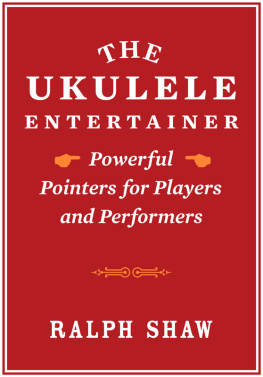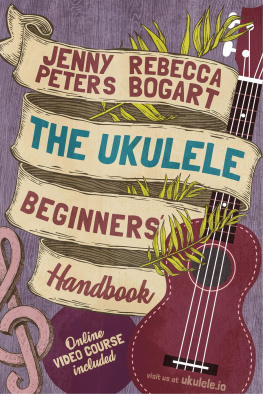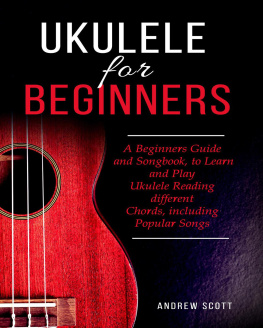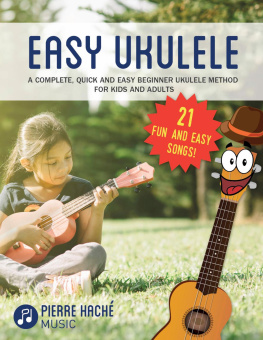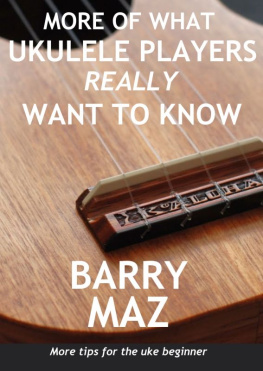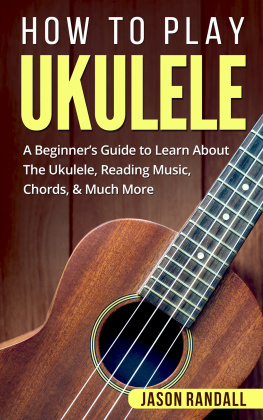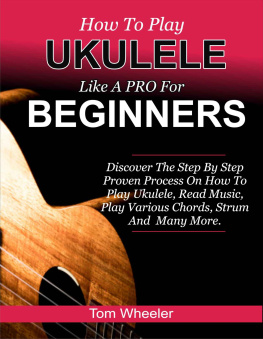Copyright 2016 by Ralph Shaw
All rights reserved. No part of this publication may be reproduced, stored in a retrieval system, or transmitted, in any form or by any means, without prior written permission of the publisher.
Prol Thacker Publishing
Vancouver, BC, Canada
www.ralphshaw.ca
Layout and cover design by Setareh Ashrafologhalai
Author photo by Kevin Clark
Part title illustrations by Setareh Ashrafologhalai
Illustration page 129 by Ben Bonham. Reprinted with permission.
Editing by Naomi Pauls, Paper Trail Publishing
Hardcopy Information
LIBRARY AND ARCHIVES CANADA CATALOGUING IN PUBLICATION
Shaw, Ralph, 1964, author
The art of ukulele : an essential handbook for players and performers / Ralph Shaw.
ISBN 978-0-9732452-8-8
eISBN 978-1-4835811-9-4
1. UkuleleInstruction and study. 2. UkulelePerformance. I. Title. mt645.s536 2016 787.8'9193 c2016-902796-1
Printed in Canada by Island Blue
Printorium Bookworks
To Sara Grey, my banjo teacher,
who with kindness and generosity
opened my nineteen-year-old eyes to
the possibility of a musical life.
And to my newsletter readers
for continuing to support my work
and for providing feedback that
entertains me as much as
I hope my writing entertains them.
CONTENTS
Foreword
Just knowing that there are this many aspects to think about in playing and performing with the ukulele makes this book worthwhile.
Ralph is an honest performer who sets out to entertain, and he succeeds! He brings an exceptional brain, amazing energy, lots of experience, quick wit, and a love and respect for people to every performance and to the pages of his books. Not many performers have the unlimited generosity to share their secrets that Ralph has.
Once, someone asked me if I thought that the ukulele was better than the violin. My answer was, I think all violinists would be better musicians if they also played the ukulele.
Every musician will benefit from knowing Ralph Shaw and reading his new book, The Art of Ukulele.
Way to go, Ralph! Another winner!
J. Chalmers Doane, OC
November 2015
Another Foreword
Twas one Wednesday night in 2007 whilst at my local pub, The Huntsman, a small but quaint retreat in South Yorkshire renowned for locally brewed hand-pulled beers, where my eyes beheld an elongated figure of a man entertaining a more-than-ever-before copiously huddled audience. Having witnessed many a band and act within these ancient timbered interiors, I know that the King of the Ukulele, without any shadow of a doubt, took the night by storm. With his unique interactive comedy, singsong, and a spectacular ukulele performance, he truly captivated the wall-to-wall folk, who in return expressed an overflow of joy on their happy faces.
After the show I was introduced to Ralph and we had such a champs chat and chuckle. I must confess that if it werent for the fact of our meeting that night, I would not have created my own act, The George Formby Experience. The idea rooted from Ralph. My uncanny resemblancelike a horse with graveyard teethto the British ukulele legend George Formby Jr. was often noted, but Id always shied away from making use of my God-given appearance. That is, until the pubs landlord, Dave Fields, handed me a ukulele on condition that I make an appearance as George with Ralph upon his next visit.
As good as said, as good as doneask Ralph! I have never looked back since. And for my new fortunes and continuing adventures, I offer my appreciation and praise to dear Ralph, whose influence from the outset paved my own ways and wares. I do urge you readers to see the King of the Ukulele live in action if you havent already done so. Ralphs CDs, I find, are such a delight and are my companion wherever I travel. Eeee by eck, and now another book to look forward to. Turned out nice again, hasnt it?
Until we meet again, Ralph, dear chap, God bless and have fun
Paul Casper (a.k.a. George Formby)
Before We Begin: Give Up on Goals
Where I take issue with our devoutly pro-goal-setting society, where we are expected to be terminally travelling towards worthy targets.
At first it seems obvious that we need goals, otherwise nothing would get done, right? But Im not talking about chores here. On laundry day youre hardly going to stop in the middle of loading the washer to have an existential crisis while you ponder whether the task really needs to be done and consider whether the end result will satisfy the goals and objectives you had in mind when you first took your socks and underwear out of the laundry hamper. No, life is full of those chores we need to do in order to just live. Im thinking more of the life-goal type of objectives.
I am of the opinion that goal setting is completely unnecessary and that theres way too much of it going on. Goal setting is a concept that enables busy people to become even busier and achieve ever more by assiduously adding more activity into their already over-caffeinated lives. Its a disease.
Indeed, its a problem that threatens our very survival. Way too many people are getting way too much done in way too short a time. Millions of businesspeople who set financial goals for themselves, their companies and shareholders are causing the obscene plundering of the Earths finite resources, not to mention damaging the health of good people beyond repair as they are forced to work in lung-searing plastic factories, soul-destroying mines and deadly sweatshops. The very air and water of our planet is being poisoned through the mindless pursuit of someone or others goals.
People set goals because they see other people getting ahead and moving quicker than they are going. So goal setting is really just a way of pushing harder and faster in order to get a bit closer to the tail ends of the front rats in the great rat race of life.
I have to wonder, how on earth did we manage before goal setting was invented? And when was that exactly? I first became aware of people sticking their goals onto refrigerator doors during the self-help craze of the 80s. Before that nobody I knew ever set a single goal. We just got inspired and then did stuff we liked doing and that was in line with our own personal sense of purpose.
When I was four I sang. At thirteen I found my Uncle Robbies old harmonica and figured out how to play. At nineteen I learned to play an old banjo I found in the attic. At twenty-one, when my roommate Rob juggled three dice during a Dungeons & Dragons game, I decided to learn to juggle. When I first held a ukulele, I knew it was something Id do for years to come. When I was twenty-four, I discovered Id acquired enough weird skills to become an entertainer.
None of these were goals I wanted to achieve; they were all just things I did because (a) they made me feel good; or (b) I felt an urge to do those things. The urge or need to work on a skill is not unlike the need to do chores. Practising an instrument is a sort of chore. If you want to play more cleanly and with self-respect, then you need to practise. But you dont set a goal. That is twisted thinking.
You may wonder, But Ralph, what harm can there possibly be in setting life goals? My problem with goals is that they are overly conscious and disconnected intellectual concepts that may be quite inappropriate for our true selves and our individual reality. Attila the Hun was a great goal setter. Just because you set a goal to do something doesnt make it right or good.
How can you possibly go within and feel what your soul wishes you to do if youre constantly inventing goals and making your family miserable with your incessant pursuit of objectives. A lot of people have taken up ukulele because they like the idea of doing it; why not, indeed. But if ukulele is not really for you, then youre wasting lifes precious hours when you might be better working in a soup kitchen, going hill walking or learning lap dancing. You need to learn what


